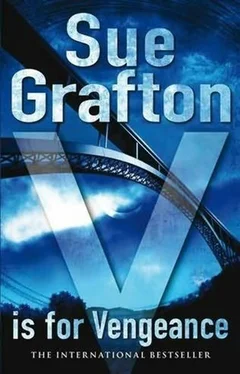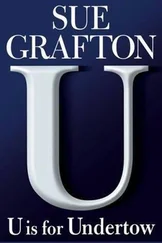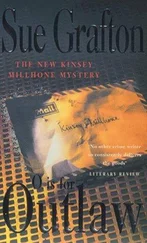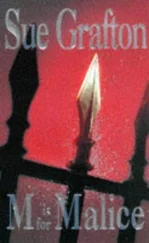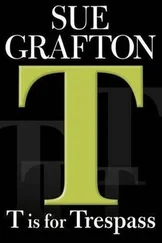“No way. She showed up at my office on Wednesday, wanting to be all buddy-buddy. I don’t talk to her about anything because I know how she operates. She’ll extract all kinds of information while swearing up and down your comments are off the record.”
“She said that just now, literally word for word. I told her I couldn’t discuss Nordstrom’s business. Mr. Koslo takes a dim view of reporters. He’s also paranoid about getting involved in the middle of a lawsuit. Not that there is one.”
“So what’d you tell her?”
“Nothing. I referred her to him. That seemed to annoy her, but I couldn’t see putting my job at risk, even if she’s a friend of yours.”
“She’s not a friend. I swear. I can’t stand the woman. She’s a pushy, calculating bitch.” I gave her a summary of her relationship to Michael Sutton and how that disaster had played out.
“What’s her interest in Audrey?” Claudia asked.
“She heard about Audrey’s suicide and now she wants to write an article about all the people who’ve taken headers off the Cold Spring Bridge. She went to Audrey’s visitation and saw my name in the guest register. Then she wheedled her way into Marvin’s good graces and he made the mistake of sending her to me. I had a fit when I realized what was going on. He’s since repented, I’m happy to report.”
“Oh, lord. She sounds like trouble. I had no idea.”
I looked up to see William approaching the table with my vodka and grapefruit juice in one hand and hers in the other. I said, “Thanks. This looks great.”
“I hope you enjoy it,” he said and then returned to the bar.
Claudia and I resumed our conversation, though there wasn’t much more to say on the subject. She was relieved to hear she hadn’t caused offense by refusing to discuss Audrey Vance with my good friend Diana Alvarez, and I was relieved she’d kept her mouth shut for reasons of her own.
In the interest of work, I skipped my run the next morning. I ate a bowl of Cheerios, then showered and donned my uniform à la Santa Teresa Services. Shoulder bag in tow, I put my sandwich-board sign in Henry’s station wagon and backed out of the garage. The school day at Climping Academy started at 8:00. By 7:30 I was parked on the berm at the bottom of the drive with my sign, which read:
This Vehicle Count is part of an Environmental Impact Study and represents your tax dollars at work. We thank you for your cooperation and apologize for any inconvenience. Drive safely!
I stood on the side of the road in my uniform, tally counter in hand, clicking off cars as they passed. On the plus side of the ledger, my shin felt better, still bruised I knew, but not throbbing. On the minus side was a visitor. Five minutes after I set up shop, a Horton Ravine patrol car rolled by and pulled over to the side of the road. The driver got out and ambled in my direction. He was wearing dark trousers and a white short-sleeve shirt. I didn’t think he was a “real” policeman. He might have been a cop wannabe, but he wasn’t driving a black-and-white, he had no badge, and he wasn’t wearing a regulation uniform for either the STPD or the sheriff’s department. In addition, he wasn’t carrying a handgun, a night stick, or a heavy-duty flashlight, which might serve as a weapon if I needed to be subdued. I was engrossed in my car count so I couldn’t give him my undivided attention.
Blond, midthirties, trim, with a pleasant demeanor. He took out a pen and pad and prepared to take notes or write a ticket, I wasn’t sure which. “Good morning. How are you?” he asked.
“I’m fine, thanks. How about yourself?”
“Good. May I ask what this is about?”
“Sure. I’m doing a vehicle count for the county.”
There was a brief delay while he processed my reply. “Are you aware this is a private road?”
“Absolutely. No doubt about it, but as long as there’s public access, it goes into my report.”
Mentally, he was going through his checklist. “You have a permit?”
“For this? I was told I didn’t need one to do a road-use analysis.”
“May I see some identification?”
“I have my driver’s license in my shoulder bag. I’ll be happy to show it to you if you can wait until there’s a break in traffic.”
He watched as two cars came through the main entrance. One turned up the drive to the school and the other continued on into Horton Ravine. Click. Click. I counted both. At the first gap in passing cars, I reached through the open window and picked up my bag from the passenger seat. He waited patiently while I paused to count a car. I took out my wallet, flipped it open, and offered it to him. He took it and jotted down my name, driver’s license number, and home address in his notebook.
I said, “That’s Millhone with two L’s. Lotta people leave out that second L.” His name, I noticed, was B. Allen. “The car belongs to my landlord. He said I could use his today because mine’s in the shop. The registration’s in the glove compartment, if you want to have a look. You’ll see that my address and his are one house number apart.”
“That’s not necessary,” he said. He handed me my license and turned to watch cars approaching.
One car passed and I dutifully clicked. He’d already fallen into the rhythm of these intermittent interruptions.
He looked back at me. “I don’t see an EPA badge.”
“Don’t have one yet. This is the first time I’ve been asked to do this. The Department of Transportation conducts an annual survey and I was tapped for it this time. Lucky me.”
“How long do you anticipate being here?”
“A day and a half, max. I tally an hour in the morning and another in the afternoon unless I’m sent somewhere else. You never know with these clowns.”
I held up a finger, saying “Hang on,” while I clicked off another car turning up the drive to Climping. “Sorry about that. We forward statistics to Sacramento and that’s the end of it as far as I know. Typical governmental boondoggle, but the pay’s good.”
He pondered the proposition. It must have been clear I wasn’t breaking the law. Finally, he said, “Well. Just so you don’t interfere with traffic.”
“I’ll be out of your hair as soon as possible.”
“I’ll let you go on about your business. Have a nice day.”
“You too. I appreciate your courtesy.”
“Sure thing.”
I was so busy maintaining the fiction that I nearly missed the Mercedes. Out of the corner of my eye, I saw a black sedan speeding up the hill toward Climping, a young girl at the wheel. I couldn’t read the bumper sticker, but it was pasted in the right spot and worth a closer look.
I waited until the Horton Ravine patrol car had pulled away. It was five minutes to eight and the cavalcade of arriving students had slowed to a trickle. I stayed at my post until 8:15 and then picked up my sign and tossed it into the backseat of the station wagon. Then I drove up the hill to Climping Academy and sailed into the parking lot. I cruised the rows of BMWs, Mercedes, and Volvos, and finally spotted the black sedan. The lot was full and I was forced to park in a slot intended for the vice principal. I left my engine running while I doubled back on foot. The girl had locked the car, which forestalled my rooting through the glove compartment for the registration and proof of insurance. I wrote down the license number, which was actually a vanity plate that read HOT CHIK. The frame on the plate was a match for the one Maria had pointed out as she wound and rewound the CCTV tape.
Now that I’d found the car, I had two choices. If I drove to the nearest pay phone, I could call Cheney Phillips and ask him to run the plate through his work computer. This would net me the name and address of the registered owner in a relatively short period of time. Strictly speaking, however, it’s against department policy, perhaps even illegal, to tap into the system for personal reasons. I was also acutely aware of Len Priddy’s presence in all of this. If I called Cheney, he’d want to know why I needed the information. The minute I told him I was on the track of Audrey’s shoplifting partner, he’d expect to be brought up to speed. Whatever I told him, even if I were vague and evasive, would go straight to Len Priddy, who was working the shoplifting angle for the Santa Teresa Police Department. While I know it’s very, very naughty to withhold information from law enforcement, I thought it wise to leave Cheney out of the equation and, thus, reduce the chances of Len Priddy getting wind of my pursuit.
Читать дальше
